Table of Contents
With the JEE Main 2025 session 1 exam around the corner, it is essential for students to practice the JEE Main previous year question papers. In the last few days before the exam, students should only concentrate on solving previous year questions and sample papers.
To help students in this regard, the Adda247 team has bundled the JEE Main Previous Year Question Papers PDF along with the solutions on this page. Candidates who are going to take the JEE Main 2024 Exam must download these JEE Main Previous Year papers and gear up their preparation.
JEE Main Previous Year Question Paper
Solving the JEE Main Previous Year Question Paper helps applicants become familiar with JEE-level questions, mark distributions, and other aspects of The JEE Main exam paper. To pass this exam with flying colors and to gain a higher rank in the JEE Main 2025 exam, all candidates are strongly encouraged to practice the previous year’s question papers by analyzing the JEE Main syllabus 2024.
Students preparing for the JEE Main examination get the opportunity to solve a variety of questions from the shift-wise JEE Main Previous Year Question Paper. You may download JEE Main previous question papers here in PDF format along with the solution key on this page. In this way, students will able to score a very good rank and a seat at the prestigious engineering institutions in India.
Download JEE Main Admit Card 2025
Structure of JEE Main Question Paper
The previous year question papers of JEE Main exam allow students to understand the exam structure in detail. To make it easier, we are providing the JEE Main question paper’s structure below.
| JEE Main Question Paper Structure | |
| Question Paper mode | Online (Computer based) |
| Number of sections | 3 |
| Question Paper Subjects | Physics, Chemistry, Mathematics |
| Time given to solve the paper | 3 hours (180 minutes)
4 hours for PwD candidates |
| questions type | MCQs: 4 options with only 1 correct option
Numerical Value Questions: Questions whose answers are to be filled in as a numerical value |
| Section A (MCQ) | Mathematics: 20 Physics: 20 Chemistry: 20 |
| Section B (Numerical Value) | Mathematics: 5 Physics: 5 Chemistry: 5In Section B, candidates have to attempt all five questions from each section. |
| No. of Questions | 75 |
| Total Marks | 300 marks |
| Language of paper | Assamese, Bengali, Kannada, Malayalam, Marathi, Odia, Punjabi, Tamil, Telugu, Urdu in addition to Hindi, English, and Gujarati |
Last year JEE Main Previous Year Paper PDF April Session
Last year JEE Main was conducted in two Sessions: January and April session. The question paper pdf for the JEE Main 2024 exam is also given below along with the solutions. JEE Main exam is divided into three papers: Paper 1 for B.E./B. Tech, Paper 2A for B.Arch, and Paper 2B for B.Planning. The JEE Main B.Tech Question Paper has 75 MCQs and numerical-type questions. Check the JEE Main previous year question paper from 2024 April Session below.
JEE Main Previous year Question Papers 2024 (January session)
The memory-based jee mains 2024 January session question paper PDF with solutions is shared based on the students ‘ understanding of the exam. As this is an online exam, only memory-based questions will be gathered. The NTA will conduct JEE Main 2024 in two shifts. A first shift runs from 9 a.m. to 12 p.m., followed by a second shift from 3 p.m Candidates can check the jee mains 2024 all shift question paper pdf in the table below.
| JEE mains 2024 January session question paper PDF | ||
| Exam Date | JEE Mains 2024 Shift 1 Paper PDF Download | JEE Mains 2024 Paper Shift 2 PDF Download |
| JEE Main 2024 January 24 | Click here | |
| JEE Mains 2024 27 January Paper | JEE Mains 2024 Question Paper 27 Jan Shift 1 PDF | JEE Mains 2024 Question Paper 27 Jan Shift 2 PDF |
| JEE Mains 2024 Question Paper of January 29 | JEE Mains 2024 Question Paper 29 Jan Shift 1 PDF | JEE Mains 2024 Question Paper 29 Jan Shift 2 PDF |
| JEE Mains 2024 Question Paper of January 30 | JEE Mains 2024 Question Paper 30 Jan Shift 1 PDF | JEE Mains 2024 Question Paper 30 Jan Shift 2 PDF |
| JEE Mains 2024 Paper for January 31st | JEE Mains 2024 Question Paper 31 Jan Shift 1 PDF | JEE Mains 2024 Question Paper 31 Jan Shift 2 PDF |
| JEE Mains 2024 Paper February 1st | JEE Mains 2024 Question Paper 1 Feb Shift 1 PDF | JEE Mains 2024 Question Paper 1 Feb Shift 2 PDF |
JEE Mains Previous Year Paper PDF Download
NTA offers the JEE Main exam in an online format in two sessions over several days. Every day and shift of the JEE Main exam has the same level of difficulty. The PDFs of the JEE Main previous year question paper PDF and their solutions are available for free download to students. Additionally, they will discover JEE Main answer keys, which applicants can use to determine the right response.
Candidates can view and download IIT JEE previous year Question Paper with solutions using the links on this page. Practice JEE Main Previous Years Question papers and online practice exams in a time-limited way, simulating the three hours it takes to complete the real paper.
Shift-wise JEE Main Previous Year Question Paper 2023 (Jan session)
The JEE Main question paper of the previous year 2023 is given below for students. The question paper pdf for all the shifts and days are given for the January session exam of the JEE Main 2023. Check out the JEE Main Last year’s question paper with solutions for the January session.
| JEE Main Last year Question Paper | Shift-1 |
Shift-2
|
|
24th January 2023
|
Download PDF | Download PDF |
|
25th January 2023
|
Download PDF | Download PDF |
|
29th January 2023
|
Download PDF | Download PDF |
|
30th January 2023
|
Download PDF | Download PDF |
|
31st January 2023
|
Download PDF | Download PDF |
|
1st February 2023
|
Download PDF | Download PDF |
JEE Mains Question Paper 2023 (April session)
As we know, JEE Main exam is conducted in two sessions: January Session (Session 1) and April Session (Session 2). Above, we presented you with the question papers of the JEE Main 2023 session 1 exam. Check out the JEE Main Last year’s question paper with solutions for the April session below.
| JEE Mains Question 2023 | Shift-1 |
Shift-2
|
| 6th April 2023 | Download PDF | Download PDF |
| 8th April 2023 | Download PDF | Download PDF |
|
10th April 2023
|
Download PDF | Download PDF |
| 11th April 2023 | Download PDF | Download PDF |
|
13th April 2023
|
Download PDF | Download PDF |
JEE Main 2022 Question Paper PDF Session-1
JEE Main Question Paper PDF of 2022 Session 1 is given below for the students. The following table contains the question paper for all the shifts and days on which the JEE Main 2022 session 1 exam was conducted.
JEE Mains 2022 Question Paper PDF Session-2
The JEE Main 2022 session 2 exam was held from 25 July to 29 July, 2022. The pdf for each of the sections of the JEE Main session 2 exam 2022 is tabulated hereunder. Check out the JEE Main Question Papers PDF of 2022 Session 2 subject-wise.
| Dates | Physics | Chemistry | Math |
| 25th July – Day 1, Shift 1 | Download PDF | Download PDF | Download PDF |
| 25th July – Day 1, Shift 2 | Download PDF | Download PDF | Download PDF |
| 26th July – Day 2, Shift 1 | Download PDF | Download PDF | Download PDF |
| 26th July – Day 2, Shift 2 | Download PDF | Download PDF | Download PDF |
| 27th July – Day 3, Shift 1 | Download PDF | Download PDF | Download PDF |
| 27th July – Day 3, Shift 2 | Download PDF | Download PDF | Download PDF |
| 28th July – Day 4, Shift 1 | Download PDF | ||
| 28th July – Day 4, Shift 2 | Download PDF | ||
| 29th July – Day 5, Shift 1 | Download PDF | ||
| 29th July – Day 5, Shift 2 | Download PDF | ||
JEE Mains Question Paper 2021
The JEE Mains Question Paper 2021 for February and March Sessions are given below for the ease of students. Along with the questions, the following PDF also contains the answers to the questions. By going through these questions, applicants will boost their morale and gain enough confidence. In summary, aspirants can use the links below to see and download previous JEE question papers along with solutions.
JEE Mains Question Paper 2021 of February Session
JEE Main 2021 question Papers Session 2 are given below.
JEE Main Question Paper 2021 of March Session
JEE Main 2021 question Papers Session 1 are given below
| Date | Physics | Chemistry | Math |
| 16th March – Day 1, Shift 1 | Download PDF | Download PDF | Download PDF |
| 16th March – Day 1, Shift 2 | Download PDF | Download PDF | Download PDF |
| 17th March – Day 2, Shift 1 | Download PDF | Download PDF | Download PDF |
| 17th March – Day 2, Shift 2 | Download PDF | Download PDF | Download PDF |
| 18th March – Day 3, Shift 1 | Download PDF | Download PDF | Download PDF |
| 18th March – Day 3, Shift 2 | Download PDF | Download PDF | Download PDF |
JEE Mains Question Paper 2020
JEE Mains Question Paper 2020 is given below in the table.
How to Download JEE mains previous year Question Paper
After the completion of the each session of the JEE mains, NTA released the JEE Mains Previous Year Question Paper PDF on its official website. Students who are preparing for the entrance exam can download the pdfs by following the steps mentioned below,
Step 1: vsiiti the official website of NTA at https://www.nta.ac.in/
Step 2: Now click on the Downloads available on the menu bar on the homepage.
Step 3: In the new page, provide year, examination Name, paper from the drop down manus and then press on the submit button.
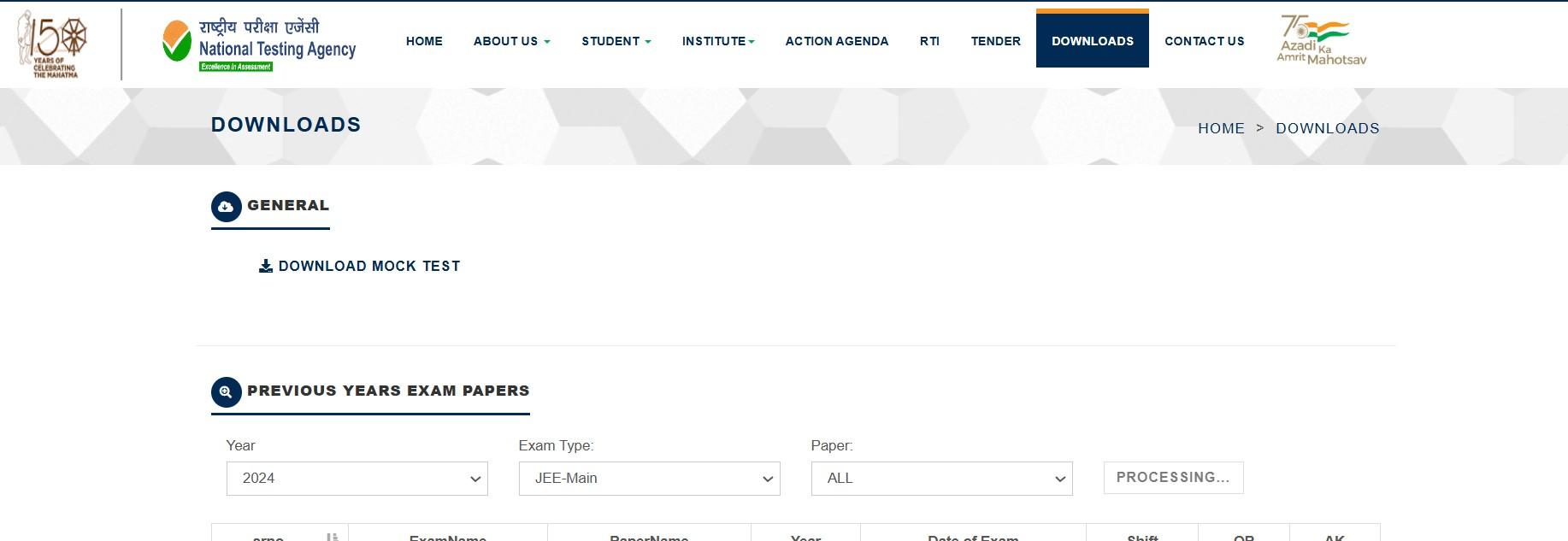
Step 4: After few seconds, all the previous year papers of the JEE Mains will be shown in the table.
Step 5: Download the respective pdf by clicking the download button and save it for future reference.
Benefits of Solving JEE Main Previous Year Question Papers
Practicing the previous year’s JEE Main question paper is a vital aspect of exam preparation. Students can profit from answering the JEE Main previous year papers pdf, which are provided below.
- Understand paper pattern: By solving the previous year’s JEE Main question paper pdf, applicants can gain an understanding of the types of questions asked in the exam, the weightage of certain topics, and the overall JEE Main exam pattern. This allows them to plan a better approach for the exam.
- Improves time management. Solving the previous year’s JEE Main question paper helps applicants become acquainted with the exam pattern and manage their time properly. It also aids in identifying specific sections. This helps discover areas for improvement in speed and accuracy.
- Increases confidence: Regularly practicing the previous year’s JEE Main question paper pdf with solutions will help candidates boost their confidence and minimize worry before the exam. They can assess their own strengths and flaws and seek to improve in those areas.
- Provides practice for the actual exam: JEE Mains past year papers allow candidates to practice the types of questions they would encounter on the actual test. This helps them become acquainted with the exam format and better prepare for the actual exam.
JEE Main Previous Year Questions
The questions below must all be answered by the students in order to review the crucial material. These inquiries can assist you in performing well on the engineering entrance exams, particularly the JEE Main 2023.
Question: Select the correct stability order of the conformation /Rotamers/ Rotational isomers of Ethane Molecule
(a) Partially Eclipsed > Fully Eclipsed > Anti-staggered > Skew or Gouche
(b) Skew or Gouche > Partially Eclipsed > Fully Eclipsed > Anti-staggered
(c) Anti-staggered > Skew or Gouche > Partially Eclipsed > Fully Eclipsed
(d) Fully Eclipsed > Anti-staggered > Skew or Gouche > Partially Eclipsed
Solution: The isomers which can be produced by the free rotation about single bond are known as conformation /Rotamers/ Rotational isomers and this phenomenon is called as conformational analysis
These isomers can be represented by
1. Sawhorse projection
2. Newman’s projection formula
3. A staggered conformer is more stable than an eclipsed conformer as the latter involves unfavourable energy interactions between atoms.
4. In conformational analysis (energetics study of different rotational conformers or rotamers), structures are represented by *Newman projection * (atoms and bonds are viewed along the axis of rotation).
Hence, the correct answer is (c).
Question:
As per IUPAC nomenclature, the name of the complex [Co (H2O)4(NH3 )2]C13 is
(a) tetraaquadiaminecobalt (III) chloride
(b) tetraaquadiamminecobalt (III) chloride
(c) diaminetetraaquacobalt (III) chloride
(d) diamminetctraaquacobalt (III) chloride
Solution:
First of all, the compound has complex positive part [Co(H2O)4(NH3)2]3+ therefore, according to IUPAC conventions, positive part will be named first. Secondly, in writing name of complex, ligands are named first in alphabetical order, irrespective of its charge, hence “ammine” will be written prior to “aqua”.
NOTE: In alphabetical order, original name of ligands are considered not the initials of prefixes. Also, special precaution should be taken in spelling name of NH3 ligand as it is ammine. Therefore, name of the complex is [Co(H2O)4(NH3)2]Cl3 is Diamminetetraaqua cobalt (III) chloride.
Hence, the correct answer is (d).
Question:
Two numbers are chosen from 1, 3, 5, 7,… 147, 149 and 151 and multiplied together in all possible ways. The number of ways which will give us the product a multiple of 5, is
Options:
(a) 75
(b) 1030
(c) 95
(d) 1020
Solution:
In the given numbers 1, 3,5,7,…, 147, 148, 151the numbers which are multiple of 5 are 5, 15, 25, 35,…, 145 which are an arithmetic sequence
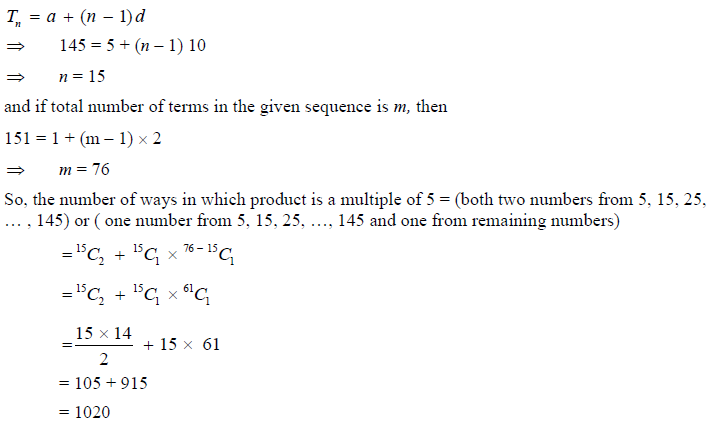
Hence, the correct answer is (d).
Question:

Solution:

Hence, the correct answer is (d).
Question:
The image of an object, formed by a plano-convex lens at a distance of 8m behind the lens, is real and is one third the size of the object. The wavelength of light inside the lens is 2/3 times the wavelength in free space. The radius of the curved surface of the lens is
(a) 1 m
(b) 6 m
(c) 5 m
(d) 3 m
Solution:

Hence, the correct answer is (d).
Question:
The resistance of a wire at room temperature 20°C is found to be 20W. Now to increase the resistance by 20%, the temperature of the wire must be [The temperature coefficient of resistance of the material of the wire is 0.002 per °C].
Options:
(a) 142°C
(b) 124°C
(c) 150°C
(d) 122°C
Solution:
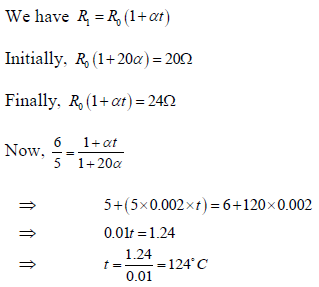
How to Solve JEE Main Previous Year Question Papers?
When preparing for the JEE exam, it is crucial to thoroughly examine and solve the previous year’s JEE main question paper in order to perform well in the actual exam. It can be achieved by solving the JEE Main previous year question papers in a efficient manner. Outlined below are some strategies for analyzing and solving the PYQs.
- Get familiar with the exam pattern: The exam structure refers to the manner in which questions are presented in the Joint Entrance Examination (JEE). In preparation for solving the JEE last year’s paper, students must first become acquainted with the exam pattern.
- Acquire Previous Year’s JEE Papers: Obtain the JEE past year’s papers from online sources or specialized bookstores.
- Set up the real exam like environment: Students should work on JEE questions from past year’s papers in an environment similar to the actual exam. Make sure to have all the necessary items like pens, pencils, erasers, and calculators within reach to avoid any obstacles while answering JEE questions.
- Use a Timer: Students should use a timer when answering each section of the JEE question paper to ensure they adhere to the time limit.
- Make sure to read the guidelines before attempting the JEE questions from last year’s paper to avoid the risk of overlooking crucial information.
- Begin with the most robust sections of the JEE previous year’s question paper to boost confidence and momentum.
Important Points to Keep in Mind while Solving JEE Main Previous Year Papers
It is essential to remember the following important points while solving the JEE question papers from the previous years.
- Use the paper sooner in your preparation phase: Solving the previous years JEE main question papers in your initial days of exam preparation can help in gaining a better grasp of the types of questions asked. This will assist in pinpointing the key topics and chapters to prioritize during the preparation journey.
- Revise the entire JEE syllabus prior to attempting JEE Main: Using previous year question papers is a routine practice that all students should follow before attempting the actual JEE Main question papers.
- During the exam, aim for a perfect score but also consider time management. It’s ideal to get 100% on your preparation, but it’s crucial to also focus on finishing within the time limit during the actual JEE exam. Therefore, when solving the JEE Mains past year question papers, avoid concentrating solely on one aspect.
- Write down the silly mistakes you make when solving JEE Mains past year papers, no matter how challenging the questions may be. It will prevent you from making the same mistakes repeatedly.
- Solve the JEE Main Previous Year Question Papers multiple times to understand each and every part of it.
Most Repeated Questions in JEE Mains Topics
For JEE Mains, certain topics and question patterns often reappear across different years. Here are some of the most repeated concepts by subject:
1. Physics
Kinematics and Newton’s Laws: Questions on motion, projectiles, and force calculations.
Electrostatics and Current Electricity: Topics like Coulomb’s law, electric field, and circuit problems.
Optics: Especially ray optics, with questions on lenses, mirrors, and reflection/refraction.
Thermodynamics and Heat: Key concepts of work, heat, laws of thermodynamics, and PV diagrams.
2. Chemistry
Organic Chemistry: Reaction mechanisms, name reactions (like Aldol condensation, Cannizzaro reaction), and isomerism.
Chemical Bonding and Molecular Structure: Questions often involve hybridization, molecular geometry, and VSEPR theory.
Coordination Compounds: Ligand types, hybridization, and crystal field theory.
Thermodynamics and Thermochemistry: Enthalpy, entropy, and Gibbs free energy.
3. Mathematics
Coordinate Geometry: Circles, parabolas, ellipses, and hyperbolas.
Calculus: Continuity, differentiability, limits, and application of derivatives.
Trigonometry: Basic identities, equations, and properties.
Probability and Statistics: Simple probability, binomial distribution, and statistics problems.
Preparation Tips for JEE Main 2025
Some useful tips while preparing for JEE Main 2025 exam is given below.
- The weightage assigned to the different topics in the JEE Main question paper must be taken into consideration when students schedule their study time. Students need to devote more time to studying difficult subjects and less time to subjects that only need to be revised.
- To ensure that students don’t overlook any material, the study plan should include a revision schedule.
- Every chapter requires notes from the students. You can use these notes to quickly review the material before the test.
- Students are required to take a lot of mock exams and solve previous year question papers. This will assist students in comprehending the format of the JEE Main question paper. Additionally, students can increase their accuracy and speed by taking a lot of practice exams.
- It is crucial to get all doubts cleared right away. If the students are unsure, they will not be able to learn more about the subject.

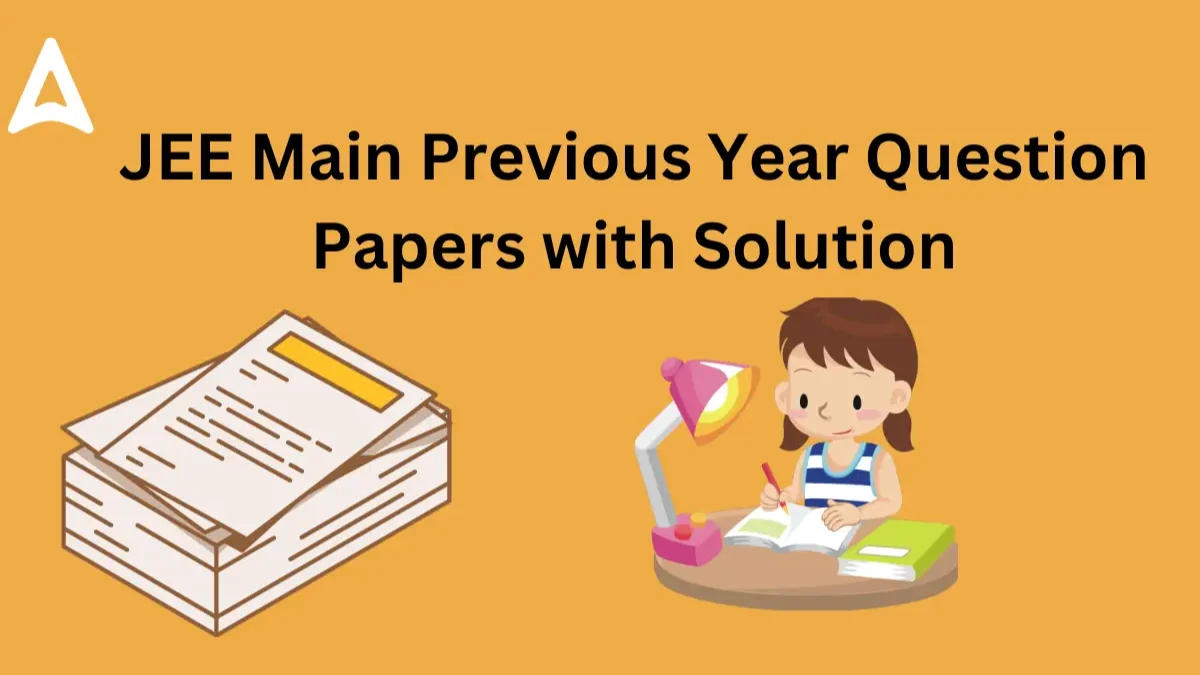


 CUET English Question Paper (2024, 2023)...
CUET English Question Paper (2024, 2023)...
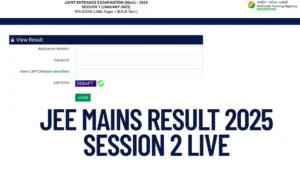 JEE Mains Session 2 Result 2025 Live: Sc...
JEE Mains Session 2 Result 2025 Live: Sc...
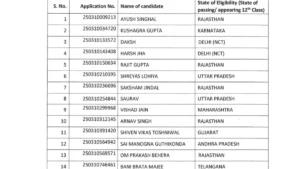 JEE Main Toppers List 2025 Out, Check JE...
JEE Main Toppers List 2025 Out, Check JE...










